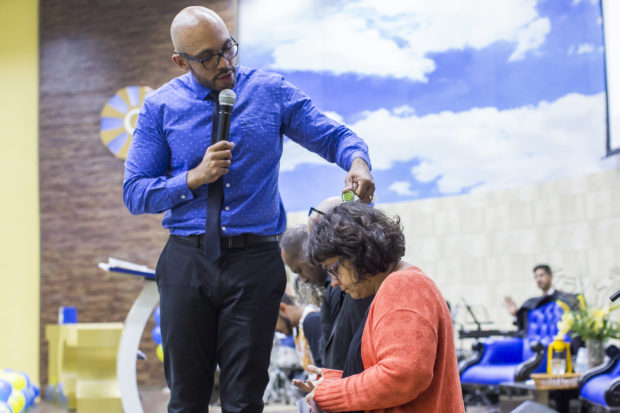
Pastor Fabio de Souza christens faithful during the Sunday service of the Contemporary Christian Church (Igreja Crista Contemporanea), the first in the country to accept members of the LGBT community, in Madureira, nothern Rio de Janeiro, Brazil, on September 24, 2017.
37-year-old Pastor Fabio de Souza, gay himself, says that homosexuals “don’t need a cure, but love”. AFP
Salt baths, fasting, salary donations, even exorcisms. Fabio de Souza had tried all kinds of cures to stop loving men. But nothing worked.
Accepting his homosexuality was a difficult choice for this fervent 37-year-old who ever since he was a young boy was taught to think that being gay was a “devil’s thing.”
“I was in constant struggle against myself. I suffered a lot. I could not accept myself,” he said.
Now an evangelical pastor in the first church dedicated to the LGBT community in Brazil, he preaches to hundreds of people every week. Homosexuality needs no cure, just love, he tells them.
He founded the Contemporary Christian Church in 2006 with his husband Marcos Gladstone after leaving a banking job in the city.
“People can change the color of their hair, but not their being. Homosexuals do not need treatment, they need love,” he said, before preaching in the church’s “cathedral” in a popular Rio neighborhood.
The demon in the womb
The World Health Organization ceased to consider homosexuality a psychological disorder in 1990, but ultra-conservative movements linked to neo-Pentecostal churches have recently stepped up a crusade against same-sex attraction.
Many gay, lesbian and transgender people who attend the Contemporary Church on Sundays have gone through so-called miracle cures, without any authority raising an eyebrow.
The controversy surrounding “gay treatment” resurfaced last month when a federal judge in the capital Brasilia overruled a 1999 decision by the top psychologists’ body that forbade their members from providing discredited treatments offering to changing gay people’s sexual orientation.
The decision provoked an outcry and thousands took part in demonstrations across Brazil on September 22.
“Here there are many ex-ex-gays,” said Fabio, who says his church has many members who were forced to participate in rituals supposed to “cure” them.
Diego Fernando, a 29-year-old waiter, said he participated in several of these rituals at the Universal Church of the Kingdom of God — one of the most powerful evangelical congregations in Brazil to which Rio Mayor Marcelo Crivella, a former evangelical bishop, belongs.
“They told me I had the devil in my body, an evil spirit that lives in me from my mother’s womb,” said Fernando, make-up highlighting his delicate features.
To “get it out” the procedure was almost always the same, he explained. He was lined up in front of a church congregation alongside other “sick people” suffering drug or alcohol addiction, for group exorcism sessions.
“There were people who fell, who hit themselves, who acted as if possessed, but it never happened to me,” he said. “I went through a very difficult time psychologically.”
Rejected on all sides, sometimes by their own family, others found themselves on the verge of suicide.
“Here we are welcomed with open arms, without prejudice,” said Katia Maria Soares, 29.
Two years ago, she separated from her husband to live with Carolina, with whom she raises three children from their respective marriages.
Healing prejudice
“If I wasn’t here, I would probably be home, drunk and feeling empty,” said Joao Barbosa, a 47-year-old nurse who has been a member of the church since the days when members had to meet clandestinely in apartments.
Today, the congregation has 10 churches spread through Brazil.
Despite a diametrically opposed interpretation of scripture regarding homosexuality, the churches resemble those of many other evangelical movements, which have been expanding in Brazil in recent years.
Here there is no rainbow flag adorning the walls, no LGBE slogans. There are three hours of joyous singing with live bands, dancing, Biblical readings and, like churches everywhere, a call for donations at the end.
However, in the last row, two ladies do not look as if they are enjoying the show.
Pastor Fabio explained that one of them has just learned that her daughter is lesbian and promised to cause a scandal when she went on stage to sing.
In the end, she left before the service ended.
“The healing process we are proposing here is against prejudice,” said Fabio’s husband Marcos. “Prejudice is the disease that needs to be cured.”